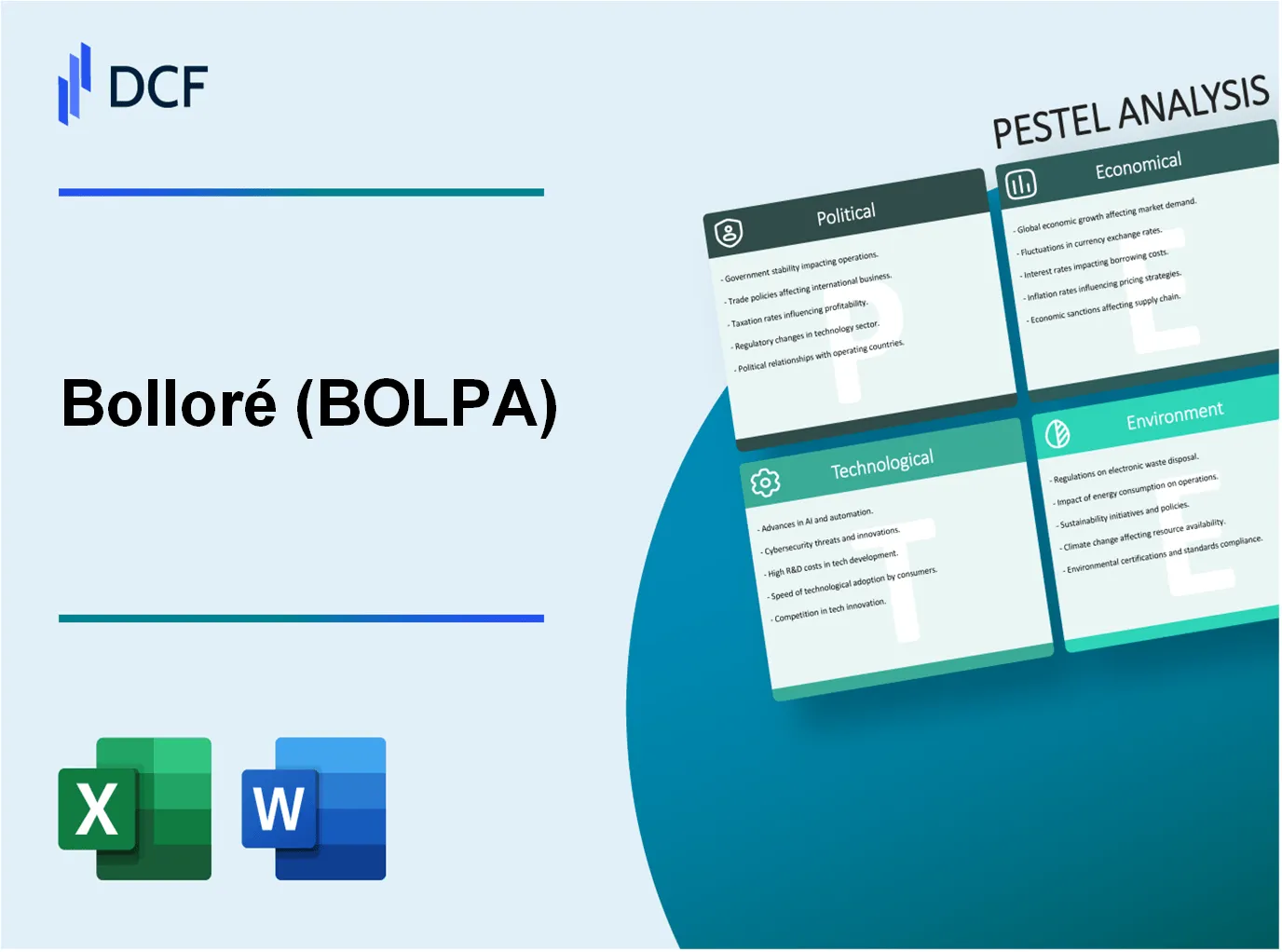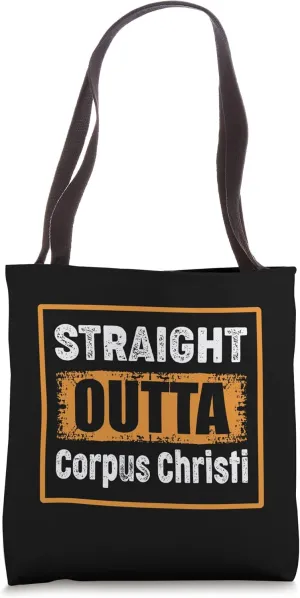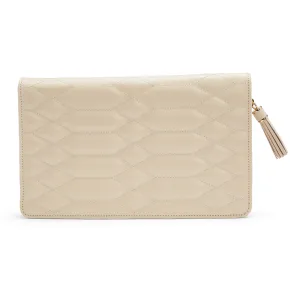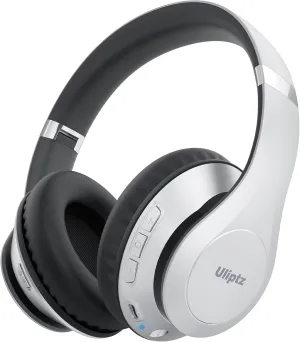Bolloré SE, a major player in logistics and transportation, operates within a complex framework shaped by various external factors. To navigate this landscape successfully, understanding the Political, Economic, Sociological, Technological, Legal, and Environmental (PESTLE) influences is crucial. From evolving trade regulations to technological advancements, these elements impact Bolloré’s strategy and performance. Dive deeper to explore how these critical factors shape the future of this influential business.
Bolloré SE - PESTLE Analysis: Political factors
The political landscape plays a crucial role in shaping the operational environment for Bolloré SE, a major player in logistics and media. Understanding the nuances of political factors affecting the company is vital for assessing its risk and growth potential.
European Union regulatory environment
The European Union maintains a stringent regulatory framework that impacts logistics and transportation companies. In 2021, the European Commission proposed the European Climate Law, aiming for a reduction of greenhouse gas emissions by at least 55% by 2030 compared to 1990 levels. Compliance with this law will require significant investment from logistics companies, including Bolloré SE, to meet sustainability targets.
Influence of French government policies
The French government has implemented policies to encourage investment in infrastructure and logistics. The French Plan for the Future allocates approximately €30 billion for infrastructure improvements, affecting Bolloré’s operational capabilities. Furthermore, the government’s commitment to digitalization and modernization aligns with Bolloré SE's strategic objectives in logistics technology.
Trade relations with African nations
Bolloré SE has a substantial presence in Africa, with operations in over 16 countries. The company benefits from the African Continental Free Trade Area (AfCFTA), which aims to boost intra-African trade by removing tariffs on over 90% of goods. This agreement could enhance trade volumes and streamline operations for Bolloré within the continent.
Tariffs and international trade agreements
Bolloré SE’s operations are also affected by tariffs imposed on goods in international trade. For instance, the trade relationship between the EU and the United States has been characterized by fluctuating tariffs, notably a 25% tariff on certain steel products that could impact logistics costs. Additionally, the EU's trade agreements with various countries, including Japan and Canada, have implications for Bolloré's logistics operations, allowing for tariff reductions on transported goods.
| Factor | Details | Impact on Bolloré SE |
|---|---|---|
| EU Climate Regulation | Emission Reduction by 55% by 2030 | Increased compliance costs and investment in green technologies |
| French Infrastructure Investment | €30 billion allocated for improvements | Enhanced operational efficiency and capabilities |
| African Trade Agreements | AfCFTA removing tariffs on 90% of goods | Increased trade volumes and market access |
| Tariffs on Goods | 25% tariff on steel products in US-EU trade | Higher logistics costs affecting competitiveness |
Bolloré SE - PESTLE Analysis: Economic factors
The global shipping industry has seen significant fluctuations in costs, which impact Bolloré SE's logistics operations. As of 2023, the average shipping cost on the Asia to U.S. West Coast route was approximately $2,000 per 40-foot container, down from a peak of around $20,000 in 2021. This dramatic reduction in shipping costs can be attributed to a shift in demand post-pandemic and increasing supply chain efficiencies.
Currency exchange rate volatility also poses a challenge to Bolloré SE, particularly as a French company with extensive operations in Africa and other international markets. In 2023, the Euro/USD exchange rate fluctuated between $1.05 and $1.15, affecting revenue from exports and the cost of imports. For instance, a **10% appreciation** of the Euro could lead to a potential loss in competitive pricing in U.S. markets, impacting profitability.
Economic growth in African markets has been a pivotal factor for Bolloré SE. In 2023, the African Development Bank projected an average GDP growth of 4.1% across the continent, with specific countries like Ethiopia and Côte d'Ivoire experiencing growth rates exceeding 5%. Bolloré's investments in transportation and logistics infrastructure in these rapidly growing economies position the company favorably to capitalize on increased trade and mobility.
| Country | Projected GDP Growth Rate (%) 2023 | Main Export Goods |
|---|---|---|
| Ethiopia | 5.5 | Coffee, textiles |
| Côte d'Ivoire | 6.0 | Cocoa, rubber |
| Ghana | 4.8 | Cocoa, gold |
| South Africa | 3.0 | Minerals, machinery |
Supply chain disruptions have become increasingly common due to geopolitical tensions, such as the Russia-Ukraine conflict, which has affected logistics and raw material availability. The World Bank reported a 80% increase in shipping delays on average globally in 2022, leading to increased costs for logistics providers. Bolloré SE has adapted by diversifying its supply routes and investing in digital solutions to enhance supply chain resilience.
In 2023, Bolloré SE's revenue from logistics and transportation services was estimated at approximately €7.2 billion, of which a significant portion came from operations in African markets. The company's strategic focus on improving operational efficiency and expanding its portfolio in key regions continues to be critical in navigating the dynamic economic landscape.
Bolloré SE - PESTLE Analysis: Social factors
Urbanization trends impacting logistics: Urbanization continues to influence logistics operations significantly. According to the United Nations, approximately 55% of the global population lived in urban areas in 2020, a figure projected to rise to 68% by 2050. This urban shift increases demand for efficient logistics solutions, particularly in metropolitan regions where congestion is a major challenge. Bolloré SE has been adapting its supply chain strategies to accommodate these dynamics. For instance, the company has expanded its urban logistics network, investing in €50 million for smart logistics projects to enhance distribution in urban areas.
Workforce diversity considerations: Diversity within the workforce is increasingly becoming a focus for companies like Bolloré SE. The firm's commitment to gender diversity is evident as it aims to achieve a female representation of 30% in management positions by 2025. As of 2021, women represented about 22% of leadership roles within the company. Moreover, in 2023, Bolloré SE reported having employees from over 20 different nationalities, emphasizing its commitment to cultural diversity and inclusion across its operations globally.
Changing consumer preferences in transport: There has been a notable shift regarding consumer preferences, heavily influencing transportation logistics. A 2022 survey by Deloitte revealed that 78% of consumers are willing to pay more for sustainable logistics solutions. As a result, Bolloré SE has been increasing its investment in greener transportation options, targeting a reduction of CO2 emissions by 30% by 2030. The company’s investments in electric vehicles (EV) for last-mile delivery have increased, with an objective to operate 100 electric delivery vehicles by the end of 2025.
Corporate social responsibility expectations: Corporate Social Responsibility (CSR) is increasingly important to consumers and investors alike. Bolloré SE has made significant strides in its CSR initiatives, reporting that in 2022, it invested approximately €10 million in community development projects. The company has committed to the United Nations’ Sustainable Development Goals (SDGs) and aims to improve its sustainability performance. A recent report highlighted that 90% of Bolloré's subsidiaries have implemented a CSR strategy, reflecting their proactive approach towards social accountability and community engagement.
| Trend/Factor | Statistics | Impact on Bolloré SE |
|---|---|---|
| Urbanization | 55% population in urban areas (2020), projected to 68% by 2050 | Investing €50 million in smart logistics |
| Diversity | 30% target for female management representation by 2025 | 22% of leadership roles currently held by women |
| Consumer Preferences | 78% of consumers willing to pay more for sustainable options | Aiming for 30% reduction in CO2 emissions by 2030 |
| CSR Investment | €10 million invested in community development (2022) | 90% of subsidiaries have a CSR strategy |
Bolloré SE - PESTLE Analysis: Technological factors
Bolloré SE has continuously leveraged advancements in logistics automation to enhance operational efficiency. The company has invested significantly in automated systems, reporting that over 60% of its logistics operations have incorporated automation technologies. This shift is projected to reduce operational costs by approximately 30% in the coming years, improving margins in a highly competitive environment.
The use of data analytics in operations is another critical factor for Bolloré SE. The company utilizes big data to optimize supply chain management, resulting in a reported 15% reduction in delivery times and a 20% improvement in inventory management. By employing predictive analytics, Bolloré SE can forecast demand with greater accuracy, which has led to a decrease in overstock scenarios by 25%.
In terms of sustainability, Bolloré SE is at the forefront of developing sustainable transport technologies. The company has committed to electrification and is actively working on the deployment of electric vehicles (EVs) across its logistics fleet. Currently, Bolloré operates over 4,000 electric vehicles in its logistics services, aiming for a fleet of 10,000 by 2025. This transition is expected to cut carbon emissions by 50% by 2030, in line with global sustainability goals.
Cybersecurity measures are also a significant focus for Bolloré SE, particularly in protecting sensitive data. The company has allocated approximately €10 million towards enhancing its cybersecurity infrastructure annually, which includes the implementation of advanced encryption protocols and regular training for employees. Recent reports indicate that Bolloré SE has experienced a 40% decrease in cyber incidents due to these measures.
| Technological Factor | Details | Impact/Outcome |
|---|---|---|
| Logistics Automation | 60% of operations automated | 30% reduction in operational costs |
| Data Analytics | Predictive analytics for supply chain | 15% reduction in delivery times |
| Sustainable Transport | 4,000 electric vehicles in fleet | 50% reduction in carbon emissions by 2030 |
| Cybersecurity Measures | €10 million annual investment | 40% decrease in cyber incidents |
Bolloré SE - PESTLE Analysis: Legal factors
Compliance with international trade laws is crucial for Bolloré SE, which operates in numerous countries. The company adheres to the World Trade Organization (WTO) regulations, and in 2022, it reported a trade compliance cost of approximately €1.2 million. This cost encompasses training, legal consultancy, and audits related to customs and export controls.
Intellectual property rights enforcement is another significant aspect for Bolloré SE, particularly in the logistics and transportation sectors. The company's investment in proprietary technology solutions has reached around €40 million as of 2023. This amount includes expenses for patent registration and legal defense against infringement cases, which have seen an increase in litigation costs by about 15% over the last two years.
Antitrust regulations in the logistics sector are scrutinizing large players like Bolloré SE closely. In 2023, the European Commission levied fines totaling €200 million against various logistics firms for anti-competitive practices. Bolloré SE has actively engaged in compliance programs to ensure adherence to these regulations, resulting in compliance costs amounting to €5 million annually.
Labor law adherence across operating regions has been a challenge for Bolloré SE, particularly in developing markets. The company reported a total of 15 labor disputes in 2022, which resulted in legal costs approximating €3 million. Employee-related compliance initiatives have been budgeted at €4 million for 2023 to ensure adherence to local labor laws, safety regulations, and fair labor practices.
| Legal Factor | Details | Financial Impact (€) |
|---|---|---|
| Compliance with international trade laws | Training, legal consultancy, and audits for customs | 1,200,000 |
| Intellectual property rights enforcement | Expenses for patent registration and legal defense | 40,000,000 |
| Antitrust regulations | Compliance costs due to European Commission scrutiny | 5,000,000 |
| Labor law adherence | Legal costs from labor disputes | 3,000,000 |
Bolloré SE - PESTLE Analysis: Environmental factors
Bolloré SE is actively pursuing carbon footprint reduction initiatives. As of 2022, the company reported a reduction of its greenhouse gas emissions by 30% compared to 2019 levels. This initiative coincided with the broader industry trend where logistics companies are aiming for substantial emission reductions by 2030, with targets such as the 50% reduction goal set by the International Maritime Organization (IMO).
Regulations on marine pollution have become increasingly stringent, with the IMO setting limits on sulfur emissions to 0.5% from ships as of January 1, 2020. Bolloré SE has responded by investing in low-sulfur fuel options and retrofitting vessels to comply with these regulations. The compliance measures are expected to incur costs of approximately €100 million in the near term but are anticipated to improve operational efficiency and maintain compliance in the long run.
In terms of implementing green logistics solutions, Bolloré SE has been expanding its fleet of electric vehicles. As of 2022, the company increased its electric vehicle fleet to over 1,500 vehicles, contributing to a reduction in fuel consumption by approximately 20%. Furthermore, Bolloré has initiated projects focusing on the use of renewable energy sources, with an aim to power 30% of its logistics operations with renewable energy by 2025.
The impact of climate change on transport routes is becoming evident, with predictions indicating that rising sea levels and extreme weather events could disrupt traditional shipping lanes. Bolloré SE has conducted assessments indicating that approximately 15% of global trade routes may be affected by climate change by 2040. The company is strategically investing in adaptive infrastructure and alternative routing to mitigate these risks.
| Initiative | Current Status | Projected Impact |
|---|---|---|
| Greenhouse Gas Emission Reduction | 30% reduction (2022 vs 2019) | Align with 2030 targets |
| Compliance with IMO Marine Pollution Regulations | Investing €100 million | Enhances operational efficiency |
| Electric Vehicle Fleet | 1,500 vehicles | 20% reduction in fuel consumption |
| Renewable Energy Usage | 30% target by 2025 | Reduces reliance on fossil fuels |
| Climate Change Impact Assessment | 15% of trade routes affected by 2040 | Investment in adaptive infrastructure |
The PESTLE analysis of Bolloré SE highlights the multifaceted challenges and opportunities it faces in the dynamic logistics and transportation sectors. By navigating the complex web of political regulations, economic fluctuations, sociological shifts, technological advancements, legal compliance, and environmental responsibilities, Bolloré SE positions itself to bolster its competitive edge and drive sustainable growth across its global operations.












